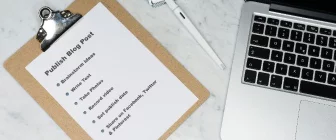
What do you do when you have a story but aren’t sure how to tell it? When you have a killer idea burning a hole in your brain, you find someone who can give your tale the literary genius it deserves.
In short, you get a ghostwriter.
Everyone from Richard Branson to Michelle Obama has brought their books to market with the help of professional writers who know how to turn a life well lived and meteoric business successes into a narrative the public would ultimately devour. Other authors, like Bond-inventor Ian Fleming and thrill-expert Tom Clancy used ghostwriters to create new works of fiction in order to meet audience demand.
Whatever your goal, realizing your long-awaited book project isn’t as easy as hiring a ghostwriter and awaiting the finished copy. This is without a doubt a collaboration, and it all hinges on you setting your writer up for success.
Recruiting Talent
When interviewing ebook ghostwriters, consider — or outright ask — the following:
- How are they with deadlines?
- Are they working on other projects, or can they dedicate their time solely to you? (If it’s the latter, be prepared to pay accordingly.) Hiring an ebook writer who tells you they don’t have the time to work on your project midway through could set you back significantly.
- Do they have set work hours? In other words, will they return an email on a Saturday, or should you expect a couple days before you get a response? Every ghostwriter works their own schedule, so knowing this upfront is key.
- Do they have experience writing in your niche? There are different types of writers, and not all will be well-suited for the task at hand. Can they reference any other ghostwriting clients of theirs?
- Are they willing to do interviews or conduct research, if applicable?
- How flexible are they? Can they adjust their writing style to fit your tone?
- Can they handle constructive criticism? Will they act as a book coach and be proactive or are they only willing to take a passive role?
- Can they share examples of other quality ebooks they’ve written?
These questions help you identify if a writer has the experience you need and if their working style matches yours. It’s critical you know this upfront, because given the time, research and writing that goes into ebooks, discovering your writer isn’t a good fit mid-project can be very costly.
Once you know what you’re looking for in a writer, the question turns to where you can find them.
You can place ads on well-known job sites and sift through resumes or ask friends for referrals; if you have a social media following or room in your budget, sponsored posts and ads may work too.
I know this sounds like a ton of work and it will take a lot of time, but there’s a shortcut: shop for writers via a platform like Crowd Content. We’ve already vetted our talent and have account managers standing by to help streamline your experience, so you won’t have to worry about the nitty-gritty details like writing up a contract or arranging payment.
Laying Out Your Objectives
Once you’ve chosen “the one” (swoon!), make your intentions clear. Traditional companies include a detailed job description in the onboarding process, and you should too. Your writer shouldn’t have any doubt as to what you’re trying to accomplish.

There’s a huge difference between writing for an audience already familiar with your work or writing a book intended for mass-market distribution. There’s also a big difference between creating a book that will be downloaded as part of an email-capture campaign or writing a book you hope will one day be turned into a major motion picture.
How the finished asset will fit into your overall campaign or sales funnel will shape the entire project. Skip this step and you put your writer at a major disadvantage — and you’re unlikely to get the results you’re hoping for, either.
Putting Together a Game Plan
Some things in life are more fun when they’re left to chance. Ghostwriting is not one of those things. You need a framework in place that includes a comprehensive to-do list and shared milestones — basically checkpoints where you and your writer will touch base or exchange notes.
Everyone’s method is different, but in general your plans should look a little something like this:
- Know your goals, budget and basic content design elements such as target length and tone
- Identify a few promising candidates, conduct interviews and ask your finalists for their project proposal
- Choose your ghostwriter
- Hand over any existing research and other relevant materials
- Decide on an outline for the book
- Set dates for a call or series of calls so the writer can ask whatever questions they need to flesh out the outline
- Agree on an expanded outline that includes a detailed chapter-by-chapter blueprint
- Look over a single-chapter draft and evaluate for structure and tone, and then let the writer loose
- Receive and read through an entire draft
- Offer feedback and go through the agreed-upon number of revisions
- Submit for editing (if you’ve hired a separate editor)
- Revel in your monumental accomplishment
Providing Data and Info
If you want data-backed results (and you do), you must start out with plenty of data your writer can use to paint an accurate and authentic picture. The type of information involved depends on the kind of book you’re creating. For an autobiography, you may want to gather everything from elementary school report cards to pictures from spring break ’99.
A business book on launching a startup won’t work without real-life success stories, while a company manual will be almost entirely made up of tech-speak you’ll probably want to run by your legal and mechanical experts before sharing.
Other bits of data are linked to your objectives. Things like your buyer persona are crucial — no one can write quality content without a specific reader in mind.
Communicating with Your Writer
I’m going to let you in on a little secret: some writers are serious introverts. And by serious, I mean that some of my favorite content writers would rather give up their beloved Oxford commas than answer a phone call. I get all that, I really do, but ghostwriting jobs are more demanding and, in many ways, more intimate than typical freelancing gigs, and your chosen form of communication should be more personal as well.
Feel free to use email to create a paper trail of ideas, trade edits or scribble and send moments of inspiration, especially if your best brainstorming happens in the wee hours. When it comes to your initial communication and ongoing discussions, though, it’s often better to connect via phone or video conference. From a face-to-face interview to shared readings of chapters currently in progress, picking up the phone or signing on to Zoom is a fast and efficient way to quickly iron out any kinks and make sure that everyone is on the same page.
Reviewing Drafts and Formulating Feedback
Real talk: you aren’t doing anyone any favors by being too nice.
Your penchant for passivity? Ditch it.
Your tendency to swallow critiques because you don’t want anyone to feel bad? Stop it right now.
Your book is your baby. That’s why you’re investing time and money into finding a professional ghostwriter to whip your concept into an award-winning book. When your ghostwriter sends you a draft, pore over it like it’s in the running for Oprah’s book club. Depending on the type of book and intended audience, you may be more concerned with grammar and citations or tone and feel.
Do the chapters feel isolated or does the book read like a cohesive whole? Does the narrative feel authentic and personal? Does the introduction grab you immediately? Is your message clear? Does the conclusion give the reader a sense of finality — or leave them wanting, depending on your goal? Are the statistics or study numbers accurate? Is this book something you’d be proud to put your name on?
It may help to read the draft out loud. Repeated readings are also useful, especially if you read the book once, sit on it for a day or two, then read it again. Don’t rush the editing process. When you do make comments, be clear about what you don’t like and why. “This doesn’t feel right” isn’t an actionable piece of feedback, but “This has a more negative tone than I wish to convey” does.
If you’d like more tips on revising effectively, check out The Writer Center’s guide for some great advice.
A Quick But Effective Process
To sum things up, remember these core tenets:
- Hire smart. A blog post is not a book, and hiring a writer who excels at one form of content doesn’t necessarily mean they can nail your ghostwriting project.
- Pony up the data/details. We’ve all read a book that went on and on without saying a thing. That’s not what you want from your own project, is it? Nope. Whether you’re sitting on client surveys, Yelp reviews, case studies, Google analytics, personal anecdotes, proof of concept — whatever it is, it should be in your writer’s inbox.
- Communicate often. Cultivate a relationship with your writer that encourages an open dialogue. If you value your writer’s opinion, they’re more likely to make suggestions that could exponentially improve your book.
- Own your results. With ghostwriting, you’ll only get what you give and ultimately, your book sales are your responsibility.
The world is waiting for your story. Isn’t it time to write a book and give your readers what they want? If you’d like to get started today, check out our ghostwriting services to find the perfect writer today.
